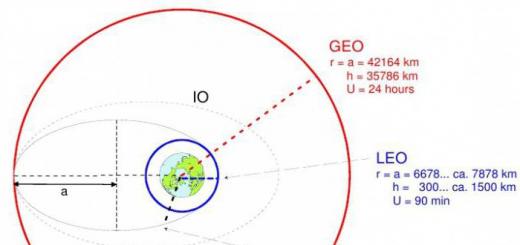), there are four main types of subordinate clauses:
- defining,
- explanatory,
- circumstantial (mode of action and degree, place, time, conditions, causes, goals, comparisons, concessions, consequences),
- connecting.
Clauses
Refers to a noun or pronoun. Answer questions about definitions which? which? which?).
Join with allied words: which, which, whose, what, where, when, from where, etc.
As well as unions: so that, as, as, exactly, as if, etc.
Examples
- [Alarm clock rang]. Alarm which?(which was given to me by my grandmother). [Alarm clock rang( that my grandmother gave me)].
- [The house burned to the ground]. House which?(Where I was born). [House( where I was born) burned to the ground].
- [A.S. Pushkin erected more than one monument]. A.S. Pushkin what?(Whose contribution to the development of Russian literature can hardly be overestimated). [A.S. Pushkin( , whose contribution to the development of Russian literature is difficult to overestimate,) erected more than one monument].
- [That day my life changed]. In a day which?(When I understood everything). [In that day( when I understood everything) my life has changed].
Clauses of explanatory
Relate to the verb. Answering case questions who? what? to whom? what? whom? what? by whom? how? etc.).
Join with allied words: who, what, which, whose, where, where, from where, how, why, why, how much
As well as unions: what, to, as if, as, as if, as if, etc.
Examples
Here the main clause is in square brackets, and the subordinate clause is in round brackets.
- [I'm sure]. Sure in what?(Because the Earth is spherical). [I'm pretty sure that the earth is spherical)].
- [He found out]. found out what?(How many days have passed since the launch of the first satellite). [He found out( how many days have passed since the launch of the first satellite)].
- [They understood]. Understood what?(Why did I do it). [They understood( why did i do it)].
Adverbial clauses
Play the role of common circumstances. Answer detailed questions. Like ordinary circumstances, they are divided into several types:
| Type of subordinate clause | Questions it answers | Linking with unions | Linking with allied words | Examples |
|---|---|---|---|---|
| mode of action | as? how? | like, what, to, as if, exactly |
|
|
| Measures and degrees | how much? in what degree? | what how | how much, how much |
|
| Places | where? where? where? | where, where, from where |
|
|
| time | when? how long? since when? How long? | when, while, as long as, as soon as, as long as, until |
|
|
| Goals | why? for what purpose? | to (to) |
|
|
| Causes | why? from what? | because, because, since, for |
|
|
| Conditions | under what condition? | if, when, times |
|
|
| concessions | in spite of what? | although, despite the fact that, let, let | no matter how much, no matter how |
|
| Consequences | and..? hence..? | so |
|
|
| Comparative | as? | as, as if, as if |
|
Adventitious connecting
Relate to the entire main body.
Join with allied words: what, where, where, where, when, how, why
Supplement and explain the content of the main part. Often they have the meaning of a consequence.
Examples
- He was worried and therefore failed to pass the exam.).
- My brother never opened the book all this time that haunted me).
see also
Notes
Links
- // Encyclopedic Dictionary of Brockhaus and Efron: In 86 volumes (82 volumes and 4 additional). - St. Petersburg. , 1890-1907.
- Main sentence - Dictionary of literary terms
Wikimedia Foundation. 2010 .
See what a "subordinate clause" is in other dictionaries:
Subordinate clause- SUBORDINATE CLAUSE. See main sentence... Dictionary of literary terms
ADDITION, weaving, m. Ozhegov's Explanatory Dictionary. S.I. Ozhegov, N.Yu. Shvedova. 1949 1992 ... Explanatory dictionary of Ozhegov
A syntactically dependent predicative part of a complex sentence containing a subordinating conjunction or allied word. Vladimir saw with horror that he drove into an unfamiliar forest (Pushkin). Describe the feeling that I experienced at that time, ... ...
The dependent part of a complex sentence containing a union or allied word. Refers to the entire main clause or to one word in it (additional, attributive clauses). F. I. Buslaev laid the foundation for ... ... Literary Encyclopedia
- (gram.). This is the name, in contrast to the main one, of such a sentence that does not have an independent, integral meaning without the main sentence. The syntactic structure of all Indo-European languages clearly shows that the creation of the category P ... Encyclopedic Dictionary F.A. Brockhaus and I.A. Efron
subordinate clause- lingu. Part of a complex sentence, syntactically subordinate to the main part (main clause) and connected with it by a union or allied word. Second sentence of reason. Conditional first sentence ... Dictionary of many expressions
subordinate clause- See main sentence... Grammar Dictionary: Grammar and linguistic terms
SUBORDINATE CLAUSE- (subsequent item, German Nachsatz), this is the name, by analogy with the terminology of grammar, the second part of the musical period, corresponding to its first part, which is called the main (previous) sentence and ends for the most part ... ... Riemann's musical dictionary
A subordinate clause that answers the question what? and referring to the member of the main sentence, expressed by a noun or a substantiated word. Subordinate attributive clauses are attached to the main clause with the help of ... ... Dictionary of linguistic terms
A subordinate clause that answers any case question and refers to a member of the main clause that needs semantic expansion: without a subordinate clause, the main clause would be structurally and semantically incomplete. Adjunctive ... ... Dictionary of linguistic terms
Syntactic constructions differ in the number of grammatical
basics. B contains one set of main members, and complex contains two or more. The subordinate part can only be in (SPP). In the design of the NGN, there is always the main part, from which in most cases you can ask a question to the dependent. That is, there is a relationship between them.
The formal sign of a subordinate clause in NGN is the presence of a means of grammatical connection (union or, as well as the impossibility of separation from the main one without loss or distortion of meaning.
Types of subordinate clauses
There are four types of dependent clauses in NGN: adjunctive, attributive, explanatory, and adverbial.
NGN with adverbial clauses is the most difficult type of complex sentences to learn.

This group of dependent parts is heterogeneous in its composition. The questions asked from the main part to the adverbial clause are exactly the same as those of the eponymous minor member of the sentence.
10 varieties of adverbial clauses
- Action pattern.
The adverbial clause of this type answers the questions: "How?", "In what way?"
The summer days passed by so quickly that we involuntarily accelerated along with them.
- Degrees and measures.
To dependent sentences in this case, you can ask questions: "To what extent?" "To what extent?", "To what extent?"
Kashtanov lied so convincingly that everyone believed his stories.
- Time.
As the name implies, such a subordinate adverbial clause indicates the moment of the event. Their typical questions are: "When?", "How long?", "Since when?"
When morning came, the camp town began to revitalize.
- Places.
This type of subordinate clause often refers to one predicate in the main part, less often to the entire sentence. "Where?", "From where?", "Where?" - the main questions of this type.
From where we are going, it will be problematic to return on foot.
- Goals.
In NGN, the adverbial clause reflects the specification of the action taking place in the main clause in terms of the final result. In other words, the design answers the question: "Why?"
To become strong, you need to train hard.

- Conditions and concessions.
Dependent sentences of these types are similar to each other in that in both cases the adverbial meaning is conditioned by something: the action occurs "thanks" or "despite".
If you find time, come visit.
Although the sun had long since set, the heat did not subside.
- Comparisons.
In NGN with an adverbial clause of comparison, such a dependent part explains the content of the main one with the help of conjunctions: "like", "as if", "as if", "exactly".
The ice on the river cracked, as if a huge mirror had cracked.
- Consequences.
Dependent parts denote the result or conclusion from the events taking place in the main sentence. The adverbial adverbial clause of this type is easy to recognize by the unions "so" and "therefore".
The wind howled louder than usual, so I fell asleep only in the morning.
- Causes.
The last type of dependent adverbial parts answers the question: "Why?" Most often, the subordinate clause of the reason is attached to the main one with the help of the unions "because", "because", "because of the fact that" and a number of others.
Maria began to get ready to go home, the first lanterns were lit on the street.
It is worth noting that for definition it is important not only to ask the right question, but also to determine the syntactic means of communication. Often it is the subordinating conjunction that suggests the type of NGN.
Subordinate clause- a syntactically dependent predicative part of a complex sentence containing a subordinating conjunction or allied word.
For example: Vladimir saw with horror that he drove into an unfamiliar forest (Pushkin). portray the feeling which I experienced at the time, very hard(Korolenko). The term used in educational practice "subordinate clause" usually replaced in theoretical works by the term "attachment"(respectively, instead of “main sentence” - “main part”); this avoids the use of the same term “sentence” in relation to the whole and to its individual constituent parts, and also emphasizes the interconnectedness of the structural parts of a complex sentence.
Subordinate clause can be associated with a single word (group of words) of the main sentence, performing the function of spreading or explaining these members.
For example: She dreams that she is walking through a snowy meadow(Pushkin) (the subordinate clause extends the predicate of the main clause dreams). His nature was one of those who need an audience for a good cause.(L. Tolstoy) (the subordinate clause explains a group of words one of those).
In other cases, the subordinate clause corresponds to the entire composition of the main clause.
For example: If grandfather left home, grandmother arranged the most interesting meetings in the kitchen(Bitter) (subordinate clause refers to the main one as a whole).
A subordinate clause can explain a word in the main clause that is not a member of the sentence.
For example: Grow, country where, by the will of a single people, all merged into one people!(Lebedev-Kumach) the subordinate clause refers to the word-address country).
A subordinate clause can refer to two main clauses as a whole.
For example: It was already quite dawn and people began to rise when I returned to my room.(L. Tolstoy).
Classification of types of subordinate clauses
School textbooks present two types of classifications of subordinate clauses.
In the complexes of T.A. Ladyzhenskaya and M.M. Razumovsky's subordinate clauses are divided into three groups: defining , explanatory and circumstantial ; the latter are divided into subgroups.
In the complex V.V. Babaytsev's subordinate clauses are divided into subject , predicates , defining , additional and circumstantial depending on which member of the sentence is replaced by the subordinate clause (to determine the type of the subordinate clause, questions are asked to various members of the sentence).
Since the most common in the practice of school and pre-university teaching is the classification adopted in the complexes of T.A. Ladyzhenskaya and M.M. Razumovsky, let's turn to her.
Let's present information about the types of subordinate clauses in the form of a summary table.
Types of subordinate clauses
| 1. Determinants (including pronouns) | Answer questions which? whose? Who exactly? what exactly? and refer to the noun or pronoun in the main part; join most often with the help of allied words which, which, whose, where
etc. and unions what, to, as if
and etc. | The native places where I grew up will forever remain in my heart; That, who does nothing, will achieve nothing; She looked like this that everyone was silent. |
| 2. Explanatory | They answer questions of indirect cases and usually refer to the predicate in the main part; join with alliances what, what, if, if, if etc. and allied words where, where, how much, which and etc. | I soon realized that I was lost; It seemed to him, as if everyone around rejoiced at his happiness. |
| 3. Circumstantial: | ||
| mode of action, measure and degree | Answer questions as? how? to what extent? in what degree? how much? and usually refer to one word in the main clause; join with alliances what, to, as if, exactly and allied words how, how, how much. | We're so tired that could not go further. |
| time
| Answer questions when? From what time? until what time? how long? when, while, as, while, as long as, while, as long as, after, barely, since, just, just before, as soon as, just, just, just, just, just a little, before, before. | Until the rain stops will have to stay at home. |
| places | Answer questions where? where? where? and usually refer to the entire main sentence; join with allied words where, where, where. | People go to folklore practice where folk traditions of song and tale are still alive. |
| goals | Answer questions why? for what purpose? and usually refer to the entire main sentence; join with alliances so that, in order to, so that, so that, so that, if only, yes, if only. | In order not to get lost, we went to the path. |
| causes | Answer questions why? from what? for what reason? and usually refer to the entire main sentence; join with the help of unions because, because, due to the fact that, due to the fact that, due to the fact that, due to the fact that, then that, since, for, good, because, due to the fact that, especially since . | Because the candle burned weakly the room was almost dark. |
| conditions | Answer the question under what condition? and usually refer to the entire main sentence; join with alliances if, if, when, if, if, how, once, how soon, whether ... whether. | If the weather does not improve within a day, the trip will have to be rescheduled. |
| concessions
| Answer questions in spite of what? contrary to what? and usually refer to the entire main sentence; join with alliances although, despite the fact that, despite the fact that, let and combinations of pronominal words with a particle no matter how, no matter where, no matter how much, no matter where. | Even though it was already past midnight b, the guests did not disperse; No matter how the tree rots, it keeps growing. |
| comparisons
| Answer questions like what? like who? than what? than who? and usually refer to the entire main sentence; join with alliances as, as, as, as if, exactly, as if, as if, as if. | Birch branches reach for the sun as if they were holding out their hands to him. |
| consequences | Answer questions about why what happened? what follows from this? and usually refer to the entire main sentence; join with union so. | The summer was not very hot so the mushroom harvest should be good. |
Subordinate explanatory clauses can be attached to the main clause with a particle whether used in the meaning of the union.
For example: He didn't know if tomorrow would come. union-particle whether can serve to convey an indirect question: They asked if we would go with them.
REMEMBER: the main question for determining the type of subordinate clauses is the semantic question.
Unions and allied words can add additional shades of meaning to a complex sentence.
For example: The village where Eugene missed was a lovely corner. This is complex sentence with an attributive clause , which has an additional spatial connotation of meaning.
In Russian, a group of complex sentences is distinguished, the subordinate parts of which cannot be called either attributive, or explanatory, or adverbial. This is complex sentences with subordinate clauses .
Such adjectives contain additional, passing, additional message to the content of the main part of the complex sentence. In this sense, such subordinate clauses often come close in meaning to plug-in constructions.
Allied words serve as a means of communication in them. what, why, why, why, as a result etc., which, as it were, repeat the content of the main part in a generalized form.
For example: His enemies, his friends, that maybe the same, he was honored this way and that.(A. Pushkin) The coachman took it into his head to go by the river, which should have shortened the naga's path by three miles.
(A. Pushkin)
It is impossible to raise a question to the connecting clauses, since in the main part of the complex sentence there is no word, phrases that would require the presence of a subordinate clause.
Algorithm for determining the type of subordinate clause
1. Define the main part of the complex sentence.
2. Determine the key word in the main part (if any).
3. Ask a question from the main part to the subordinate clause:
b) from the predicate in the main part;
c) from a noun or pronoun in the main part;
d) it is impossible to ask a question to the subordinate clause (with adjunctive and comparative).
4. Indicate the means of communication in the subordinate part (unions or allied words).
5. Name the type of subordinate clause.
The subordinate clause in Russian is of particular difficulty in determining its type on the Unified State Examination in the second part. In fact, the definition of this very species does not cause big problems if you correctly ask questions from the main part.
A subordinate clause is a subordinate clause and a dependent clause. As you know, the subordinate clause can stand not only at the beginning of a sentence, but also in its middle or end. An important rule: any subordinate part is separated from the main comma or other signs. Subordinate parts can explain both the main part and each other. If several subordinate clauses explain each other, then this is called if the subordinate clauses explain the main one - parallel (in this case, as a rule, the subordinate parts have a common union).
Subordinate clauses in German have a clear sequence of words, which cannot be said about Russian. There, each word has its place: the subject, then the predicate, and only then the secondary members. And subordinate clauses in English can play the role of a predicate, subject or object.

So, the subordinate clause in Russian has several types.
1) definitive (the main questions of common definitions are what? what?; they are connected only with the help of unions: what, which, which, whose). Example: The house that stood on the mountain was the property of my grandmother.
2) explanatory (questions Example: I know that everything will be fine soon.
3) circumstantial (have their own structure):

Thus, the subordinate clause in Russian explains and completes the main part of the complex sentence. To determine the type of this sentence, it is enough just to correctly pose the question to that part, the meaning of which is revealed by the subordinate clause.
Connecting subordinate clauses contain an additional message about the proposal expressed in the main part.
An additional message may include an explanation, an assessment of the message given in the main part, a conclusion from it, or additional remarks related to the content of this message, and in the main part of the sentence there are no formal grammatical features indicating that the subordinate clause (beyond except for intonational incompleteness), i.e., it does not need a subordinate clause, but the clause is clearly dependent, since it has a formal indicator of subordination - a union word, and its meaning without the main part is indefinite. This allied word, as it were, contains the content of the previous main part (in whole or in part). In a complex sentence
One of the main benefits of hunting, my dear readers, is that it makes you constantly move from place to place, what very nice for an unemployed person(T.)
the first subordinate clause attached by the union "what", - explanatory, its necessity is due to the structure of the main part of the sentence (the correlative word in that requires specification). The construction of the explanatory clause is such that it does not necessitate a new clause following it, and the latter has the character of an additional remark about the main statement (assessment of its content). This is the connecting part. The nature of its syntactic relations with the preceding part of the sentence resembles the relationship between the parts of a compound sentence, as evidenced by the possibility of replacing the allied word "what" combination "and this" (cf.: And this is very pleasant for an unemployed person), which is unacceptable in a subordinate explanatory clause.
Subordinating-attaching relations are expressed using allied words "what" (in various forms), "where", "where", "whence", "when", "why", "why", "what for", "how".
The allied word is most often used in the joining function "what" (in various forms):
Maxim, shaking his head, muttered something and surrounded himself with particularly thick clouds of smoke, what was a sign of intensified work of thought(Kor.);
He built a house according to his own plan, started a cloth factory, arranged incomes and began to consider himself the smartest man in the whole neighborhood, what and the neighbors did not rebuke him ...(P.);
... She is a fox trail(wolf) mistook for a dog and sometimes even lost her way, what never happened to her when she was young(Ch.).
allied words "why", "why", "why" attach sentences with causal and target shades of meanings:
The goose took another rope in its beak and pulled it, from what immediately there was a deafening shot(Ch.);
My brother had to pass the entrance exams to the institute, why he came to the city;
It was getting dark in the forest why and had to return home.
The least common in subordinate clauses are allied words "where", "where", "whence", "when" and union "as", introducing shades corresponding to their lexical meaning: spatial, temporal, comparative. Moreover, their connecting function is revealed only in combination with the following "and" (“where and”, “when and”, “how and”). For example:
He returned home at exactly five o'clock, when and should have come;
...The truth was that he had indeed fainted, like confessed later(Dost.);
Weak from loss of blood, Benny fell on the battlefield, where and was found unconscious(Lesk.).
Connecting clauses, as a rule, are located after the main part or less often - in the middle. Allowable in some cases, placing them at the beginning of the sentence creates the character of inversion:
Whatoften happens in Indian summer, in the morning the overcast sky began to cheer up in the afternoon, and the soft sun without shadows illuminated the earth(Fed.).
As a result of frequent use, some connecting constructions have turned into stable turns of a phraseological nature: "which is to be expected"; "Q.E.D"; "with which I congratulate you."










